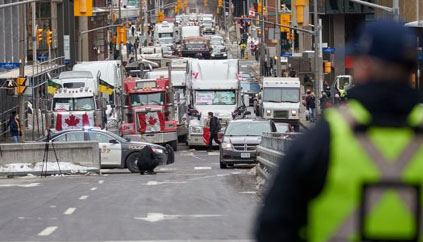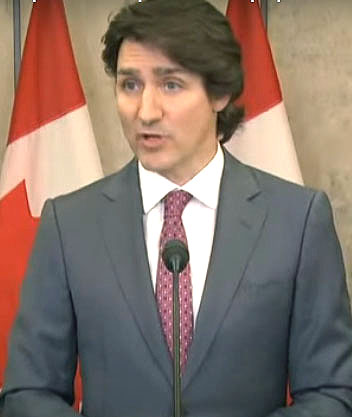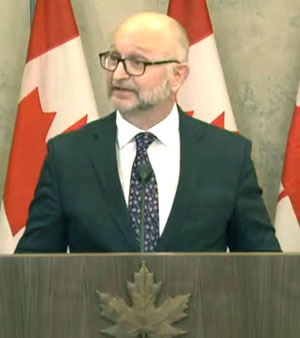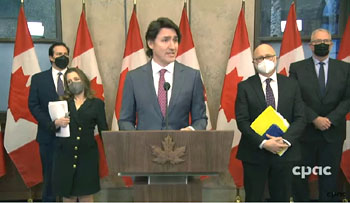
Monday February 14, 2022 | NATIONAL
by Mary P Brooke | Island Social Trends
Today was a first in Canada. The Emergencies Act of 1988 has been used for the first time.
As announced at 1:30 pm (Pacific) by Prime Minister Justin Trudeau, the Emergencies Act comes into effect immediately and can run for 30 days with the option for renewal. It can also be cancelled sooner than 30 days. [Full Feb 14, 2022 Emergencies Act announcement on YouTube]
The Emergencies Act is a temporary measure, explained Trudeau, to deal with extraordinary circumstances in a time-limited manner. There is a committee for parliamentary review.
Along with this announcement, anyone participating in the trucker convoy — which has been seen to be an obstructive demonstration far beyond legal political protest — was effectively a final warning.
Advised to leave and go home, anyone participating in the blockades has one last chance to leave without direct or immediate repercussions.
Law enforcement now has the authorization and resources to require vehicle towing companies to remove any trucks or other vehicles that remain in the blockade locations.
Blockades are currently happening in downtown Ottawa (near the Parliament Buildings), on the Manitoba/USA border at Emerson, on the Alberta/USA border at Coutts, and in BC near the USA border in Surrey.
Earlier today, the blockade at the Ambassador Bridge in Windsor at the USA border was dispersed by local law enforcement. That blockade resulted in significant interruptions to the automotive sector (including cancellation of employee work shifts) that ships parts and vehicles across the Canadian-US border.
Not a peaceful protest:
“This is not a peaceful protest,” said Trudeau in his opening statement today. The actions of the participants in the blockade are “harming the economy” and endangering people. It’s “hurting workers who rely on these jobs to feed their families,” the Prime Minister explained.
“Local authorities are doing their best to keep the peace,” he said. But said that bringing in the Emergencies Act “was the responsible and necessary thing to do”.
Implications at home:
“Canada is a rule of law country. We are following the law and acting within it,” said Minister of Justice David Lametti today after Trudeau announced the step to use the Emergencies Act, and after Deputy Prime Minister and Finance Minister Chrystia Freeland outlined the financial implications for truckers and others who don’t comply with the directive to leave the blockade locations.
This is the first time that federal law has been brought to bear in ways not seen before in Canada. Part of the Emergencies Act allows the government to direct financial institutions to freeze bank accounts.
Truckers who have bank loans or other financial arrangements to pay for their commercial vehicles will not be able to make payments on the loans, effectively allowing for their vehicles to be seized. In many cases this would have a measurable and significant impact on the livelihoods of a trucker or small business that is caught up in this situation.
Today Trudeau said that the measures enforced by the Emergencies Act would be geographically specific. But every Canadian rightfully is aware that any region could, in theory under such a measure, be impacted.
Every Canadian will also sensibly be aware of how the banking system can be directed to impact individuals or their businesses.
Following the money:
“This is about following the money,” wrote Deputy Prime Minister Freeland on her Twitter feed today. “This is about stopping the financing of these illegal blockades. We are today serving notice: if your truck is being used in these protests, your corporate accounts will be frozen.”
International implications:
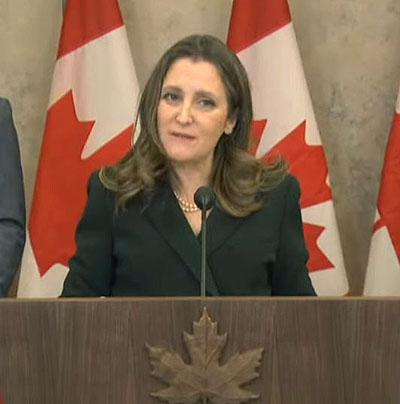
The Canadian government is worried about the broader implications of the blockades that have dragged now into a third week. Politicians in US border-states have already been expressing concerns about cross-border supply chain reliability.
Today Freeland expressed her concerns about how hard Canada worked during the NAFTA negotiations to keep cross-border trade fluid and strong. “The Canadian economy needs them (the truckers and truckers) to be doing legitimate work, not to be making us all poorer,” said Freeland today in her formal remarks in Ottawa during the media session.
Freeland outlined how cryptocurrency and crowd-source funding are now brought under the reach of the Emergencies Act.
Opposition parties:
The Conservatives have been on both sides of the fence during the period of the trucker protests that turned into blockades. In the early days they visited with and did photos ops with some of the truckers, expressing support for their right to protest. Now Interim Conservative leader Candice Bergen is also advising the truckers to go home.
The NDP have been asking for action against the blockades since after the first weekend, when it was obvious the situation was dug-in and escalating. Alistair MacGregor, MP (Cowichan-Malahat-Langford) tabled a motion in the Public Safety Committee which was passed, asking for measures to learn the source of crowd-funding contributions and to restrict foreign contributions through those online fund-collection mechanisms.
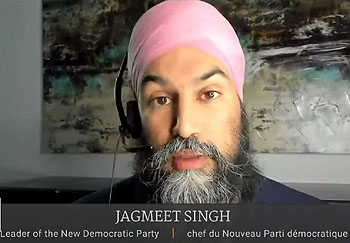
After a week or so, NDP Leader Jagmeet Singh urged the Prime Minister to hold an Emergency Debate in the House of Commons, which was held the very next day on February 7 (watch the February 7, 2022 Emergency Debate video).
“It starts with addressing the things that have clearly gotten worse with this pandemic,” said Singh. Top of the list for Canadians is finding affordable housing, or any housing at all, said Singh.
“Life is getting harder. People can’t afford their groceries,” said Singh. It’s actually quite amazing that this basic realization needs to be brought to the active attention of government.
Evident frustrations:
To see and hear — thanks to on-the-ground journalists and their media outlets — individual truckers and other supporters of the protests (turned blockades) say that they have nothing to lose even when advised they would face significant financial fines or even jail time, indicates the sense of loss and hopelessness that some Canadians have endured during the now-two-years of the pandemic.
For some if not many in our society it’s been longer than two years. The economy of the past 40 years has significantly and robustly set a widening wedge between the financially secure and successful and those who are losing more and more security.



